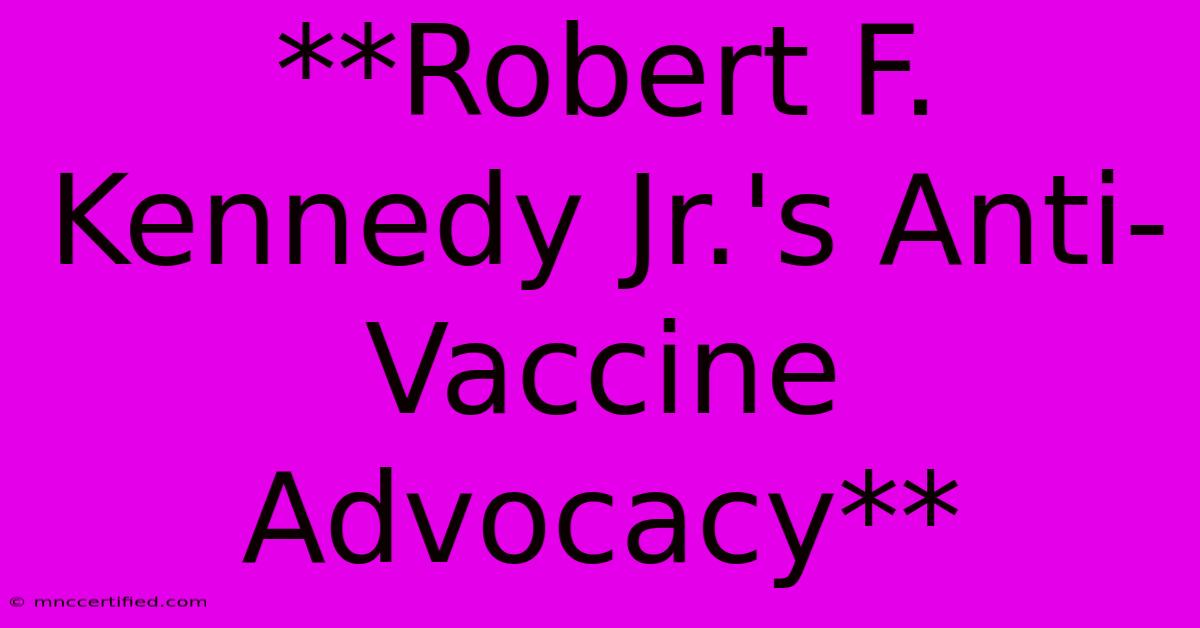**Robert F. Kennedy Jr.'s Anti-Vaccine Advocacy**

Table of Contents
Robert F. Kennedy Jr.'s Anti-Vaccine Advocacy: A Controversial Legacy
Robert F. Kennedy Jr., a prominent environmental lawyer and the nephew of former President John F. Kennedy, has gained notoriety for his outspoken anti-vaccine advocacy. His views have ignited a fierce debate, raising questions about the safety and efficacy of vaccines and the role of misinformation in public health.
The Roots of Kennedy's Anti-Vaccine Stance
Kennedy's skepticism towards vaccines stems from his belief that they contribute to the rise of autism. This conviction is based on a now-discredited study published in the medical journal The Lancet in 1998, which claimed a link between the MMR vaccine and autism. The study was later retracted and its author, Andrew Wakefield, lost his medical license.
Despite this scientific consensus, Kennedy has continued to promote the discredited study and other anti-vaccine theories. He argues that vaccines contain harmful ingredients like mercury and aluminum, and that they can cause a range of health problems, including autism, autoimmune disorders, and even death.
The Scientific Consensus on Vaccines
The scientific community overwhelmingly supports the safety and efficacy of vaccines. Numerous studies have debunked the claims of a link between vaccines and autism, and the World Health Organization (WHO) has repeatedly declared vaccines to be one of the most successful public health interventions of all time.
Vaccines work by exposing the body to a weakened or inactive version of a virus or bacteria, triggering an immune response without causing illness. This allows the body to build immunity and prevent future infections.
The Impact of Anti-Vaccine Advocacy
Kennedy's anti-vaccine rhetoric has contributed to a rise in vaccine hesitancy and refusal, leading to a decline in vaccination rates. This, in turn, has led to outbreaks of preventable diseases like measles, mumps, and whooping cough.
The consequences of declining vaccination rates can be severe, particularly for vulnerable populations like infants and children. Outbreaks of preventable diseases can lead to hospitalizations, disabilities, and even death.
The Importance of Evidence-Based Information
In the face of misinformation and conspiracy theories, it is critical to rely on credible and evidence-based sources of information. Public health officials, medical professionals, and reputable scientific organizations provide reliable information on the safety and effectiveness of vaccines.
It is important to engage in critical thinking and evaluate sources carefully before accepting information, particularly when it comes to sensitive topics like vaccines.
Conclusion
Robert F. Kennedy Jr.'s anti-vaccine advocacy has had a significant impact on public health. His stance, based on discredited evidence and conspiracy theories, has contributed to a decline in vaccination rates and an increase in preventable diseases. It is crucial to rely on scientific evidence and credible sources of information when making decisions about vaccines. The health and well-being of our communities depend on it.
Keywords: Robert F. Kennedy Jr., anti-vaccine, vaccine hesitancy, autism, MMR vaccine, measles, mumps, whooping cough, public health, misinformation, scientific consensus, evidence-based, vaccine safety, vaccination rates

Thank you for visiting our website wich cover about **Robert F. Kennedy Jr.'s Anti-Vaccine Advocacy** . We hope the information provided has been useful to you. Feel free to contact us if you have any questions or need further assistance. See you next time and dont miss to bookmark.
Featured Posts
-
Wordle Answer November 14 1244 Revealed
Nov 15, 2024
-
Tate Mc Rae Concert August 13 2025
Nov 15, 2024
-
Apartment Building Insurance Quote
Nov 15, 2024
-
Composite Bonding After Invisalign
Nov 15, 2024
-
Cynthia Erivo Embraces Dark Glamour Style
Nov 15, 2024